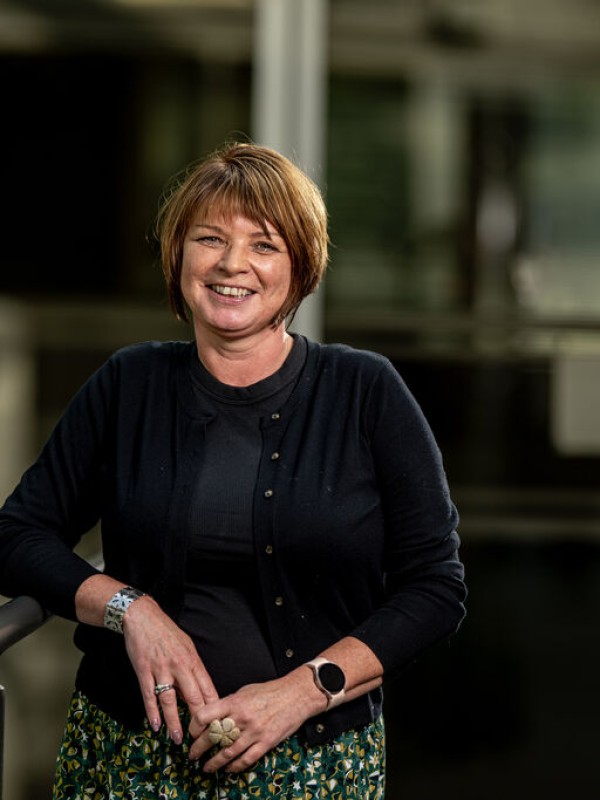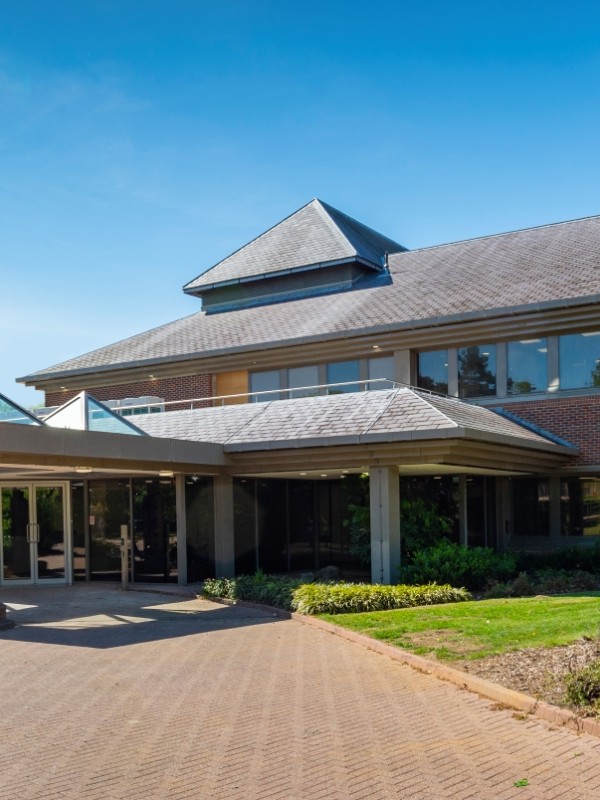
- Specialist Practice Nursing (Top Up)
MSc — 2026 entry Specialist Practice Nursing (Top Up)
This top-up masters course is open to graduates of our SPQ and SCPHN specialist practice PGDip programmes, from the September 2024 cohort onwards. You’ll get the chance to complete a dissertation that is relevant to your professional practice and develop critical skills that will help advance your career.
4,138+ people have created a bespoke digital prospectus
Why choose
this course?
- Complete an original dissertation project which will be relevant to your healthcare practice, and which could have a significant impact on healthcare service design, service users or workforce experience.
- Develop skills in research and critical thinking, as well as writing, translating knowledge into practice, literature reviewing and digital competency.
- Gain a qualification that will help you to progress to more senior roles, such as advanced practice, management, leadership and education, and open up research opportunities.
- Take advantage of a highly flexible course, which you can start up to five years after completing your postgraduate diploma.
Please note: this course is only open to graduates of our primary and community care SPQ and public health practice SCPHN PGDip programmes from the September 2024 cohort onwards. See entry requirements for more details.
Statistics
11th in the UK
For nursing in the QS World University Subject Rankings 2025
92%
Of our postgraduate health sciences graduates are in employment or further study within 15 months of graduating (Graduate Outcomes survey 2025, HESA)
What you will study
On this course, you will plan, undertake and report on a substantial original project that is relevant to your professional practice and workplace organisation.
Your project may involve:
- Developing a research question and outlining the relevant policy context
- Carrying out a literature review
- Developing a robust methodology
- Collecting, identifying, analysing and synthesising data
- Critically discussing the relevance of your findings to practice and current knowledge in healthcare.
You’ll be assigned a supervisor who will support you throughout the course.
Facilities
You’ll benefit from our multimillion-pound facilities, including our lecture theatres and seminar rooms, designed to promote knowledge exchange and networking with other healthcare professionals.
This is a full-time, 16-month course with entry points in either November or May each calendar year. As part of the programme, you will complete a dissertation module which includes four taught days, scheduled at intervals throughout the course.
The structure of our programmes follows clear educational aims that are tailored to each programme. These are all outlined in the programme specifications which include further details such as the learning outcomes:
Modules
Modules listed are indicative, reflecting the information available at the time of publication. Modules are subject to teaching availability, student demand and/or class size caps.
The University operates a credit framework for all taught programmes based on a 15-credit tariff, meaning all modules are comprised of multiples of 15 credits.
Course options
Year 1
Across academic years
Core
The dissertation module supports students to plan, undertake and report on a substantial original project that is relevant to their professional practice and their workplace organisations. Students will choose a topic area of their interest and will be supported throughout the project by a named supervisor. The project will involve developing a relevant research question and outlining the relevant policy context, carrying out a literature review, developing a robust methodology, collecting/identifying and analysing/synthesizing data, and to critically discuss the relevance of the findings to practice and current knowledge. Students will gain confidence in understanding and applying the research process. The students will have the opportunity to develop skills in research leadership, critical thinking, and writing, translating knowledge into practice, literature reviewing and digital knowledge.
View full module detailsTeaching and learning
You will benefit from a blend of learning methods, designed to provide support and flexibility throughout the course. You will also be given supervision support and carry out some self-directed study.
Learning methods
Your teaching will be delivered through a combination of:
- Group work
- Lectures
- Online learning
- Seminars
Assessment
You’ll submit your work to your project supervisor for formative assessment and feedback.
You’ll receive feedback through a variety of methods, including:
- Verbal feedback
- Written formative feedback on draft work
- Summative feedback on your submitted dissertation.
General course information
Contact hours
Contact hours can vary across our modules. Full details of the contact hours for each module are available from the University of Surrey's module catalogue. See the modules section for more information.
Timetable
Students will receive their timetable at the beginning of the dissertation module. If you have not received any information about the module at least three weeks before it begins, please contact the programme leader.
Location
Our medicine, paramedic science, nursing and midwifery, and CPD health sciences courses are taught at the Kate Granger Building (30 Priestley Road) on the Surrey Research Park.
We offer careers information, advice and guidance to all students whilst studying with us, which is extended to our alumni for three years after leaving the University.
This course will give you highly desirable and transferable skills within the sector, such as research expertise, digital competency, advanced writing ability and critical evaluation.
Your dissertation project will be relevant to your current professional practice and workplace organisation, which means your work will have a direct impact on your career. Achieving this qualification will help you to access more advanced roles within the healthcare sector in areas such as nursing education and leadership, and management and advanced practice.
92% of our postgraduate health sciences graduates are in employment or further study within 15 months of graduating (Graduate Outcomes survey 2025, HESA).
UK qualifications
Successful completion of a Postgraduate Diploma from September 2024 or later in Public Health Practice SCPHN or Primary and Community Care SPQ at the University of Surrey.
Applicants must be an NMC registrant who has an active recordable Specialist Practice Qualification (District Nursing or Community Children’s Nursing) or a registered SCPHN Health Visitor or School Nurse qualification.
English language requirements
IELTS Academic: 7.0 overall with 6.5 in each element.
These are the English language qualifications and levels that we can accept.
If you do not currently meet the level required for your programme, we offer intensive pre-sessional English language courses, designed to take you to the level of English ability and skill required for your studies here.
Recognition of prior learning
We recognise that many students enter their course with valuable knowledge and skills developed through a range of ways.
If this applies to you, the recognition of prior learning process may mean you can join a course without the formal entry requirements, or at a point appropriate to your previous learning and experience.
There are restrictions for some courses and fees may be payable for certain claims. Please contact the Admissions team with any queries.
Scholarships and bursaries
Discover what scholarships and bursaries are available to support your studies.
Fees per year
Explore UKCISA’s website for more information if you are unsure whether you are a UK or overseas student. View the list of fees for all postgraduate courses.
May 2026 - Full-time - 16 months
- UK
- £2,995
- Overseas
- £2,995
- These fees apply to the academic year 2026-27 only. Fees are reviewed annually, and tuition fees may increase for courses running over more than one year.
Payment schedule
- Students with Tuition Fee Loan: the Student Loans Company pay fees in line with their schedule (students on an unstructured self-paced part-time course are not eligible for a Tuition Fee Loan).
- Students without a Tuition Fee Loan: pay their fees either in full at the beginning of the programme or in two instalments as follows:
- 50% payable 10 days after the invoice date (expected to be October/November of each academic year)
- 50% in January of the same academic year.
- Students on part-time programmes where fees are paid on a modular basis: cannot pay fees by instalment.
- Sponsored students: must provide us with valid sponsorship information that covers the period of study.
The exact date(s) will be on invoices.
Additional costs
- Travelling expenses such as those incurred for travelling to the University
- General programme-related costs such as study materials
- Potential costs involved in working/studying remotely, e.g. internet connection.
Funding
You may be able to borrow money to help pay your tuition fees and support you with your living costs. Find out more about postgraduate student finance.
How to apply
Applications are now open for May 2026 entry. Apply now.
Applications close Tuesday 24 March 2026.
Admissions information
Once you apply, you can expect to hear back from us within 14 days. This might be with a decision on your application or with a request for further information.
Our code of practice for postgraduate taught admissions explains how the Admissions team considers applications and admits students. Read our postgraduate applicant guidance for more information on applying.
About the University of Surrey
Need more information?
Contact our Admissions team or talk to a current University of Surrey student online.
Terms and conditions
When you accept an offer to study at the University of Surrey, you are agreeing to follow our policies and procedures, student regulations, and terms and conditions.
We provide these terms and conditions at offer stage and are shown again at registration. You will be asked to accept these terms and conditions when you accept the offer made to you.
View our generic registration terms and conditions (PDF) for the 2025/26 academic year, as a guide on what to expect.
Disclaimer
This online prospectus has been published in advance of the academic year to which it applies.
Whilst we have done everything possible to ensure this information is accurate, some changes may happen between publishing and the start of the course.
It is important to check this website for any updates before you apply for a course with us. Read our full disclaimer.






